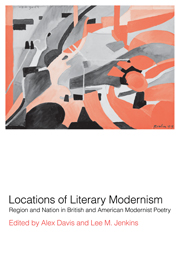Book contents
- Frontmatter
- Contents
- Notes on contributors
- Preface
- INTRODUCTION
- PART ONE OBSTINATE ISLES: THE ANGLO-CELTIC ARCHIPELAGO
- 1 MacDiarmid in Montrose
- 2 Bunting and Welsh
- 3 Antithesis of place in the poetry and life of David Jones
- 4 ‘Shut, too, in a tower of words’: Dylan Thomas' modernism
- 5 ‘Literally, for this’: metonymies of national identity in Edward Thomas, Yeats and Auden
- 6 Reactions from their burg: Irish modernist poets of the 1930s
- PART TWO AN AMERICAN PLACE
- Notes
- Index
6 - Reactions from their burg: Irish modernist poets of the 1930s
Published online by Cambridge University Press: 06 July 2010
- Frontmatter
- Contents
- Notes on contributors
- Preface
- INTRODUCTION
- PART ONE OBSTINATE ISLES: THE ANGLO-CELTIC ARCHIPELAGO
- 1 MacDiarmid in Montrose
- 2 Bunting and Welsh
- 3 Antithesis of place in the poetry and life of David Jones
- 4 ‘Shut, too, in a tower of words’: Dylan Thomas' modernism
- 5 ‘Literally, for this’: metonymies of national identity in Edward Thomas, Yeats and Auden
- 6 Reactions from their burg: Irish modernist poets of the 1930s
- PART TWO AN AMERICAN PLACE
- Notes
- Index
Summary
In 1917 A. R. Orage's New Age printed a series of three articles by Ezra Pound that, in defence of ‘civilization’, targeted ‘Provincialism the Enemy’. In the third essay, in the course of arguing that ‘a definite start on the Channel Tunnel would be worth many German defeats’, Pound attacks the ‘sub–sectional criers within [these] Islands’, concentrating his scorn on Ireland, principally on the Northern Unionists but without sparing Irish nationalism:
Neither from South Ireland nor from Ulster has anyone spoken on behalf of civilisation, or spoken with any concern for humanity as a whole. And because of this the ‘outer world’ not only has no sympathy, but is bored, definitely bored sick with the whole Irish business, and in particular with the Ulster dog–in–the–manger. No man with any care for civilisation as a whole can care a damn who taxes a few hucksters in Belfast, or what rhetorical cry about local rights they lift up as a defence against taxes. As for religion, that is a hoax, and a circulation of education would end it. But a nation which protects its bigotry by the propagation of ignorance must pay the cost in one way or another. Provincialism is die enemy.
- Type
- Chapter
- Information
- Locations of Literary ModernismRegion and Nation in British and American Modernist Poetry, pp. 135 - 156Publisher: Cambridge University PressPrint publication year: 2000



